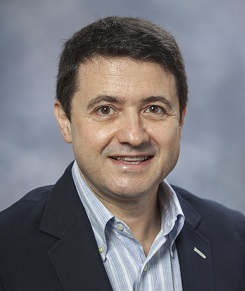2016 IEEE INTERNET AWARD
Sponsored by Nokia Corporation

HENNING SCHULZRINNE
For formative contributions to the design and standardization of Internet multimedia protocols and applications
The multimedia-capable Internet that we now take for granted was made possible by Henning Schulzrinne’s fundamental contributions to the development of network protocols, applications, and algorithms for the effective transport of audio and video signals. He helped migrate the Internet from a medium containing primarily text and images to one featuring both real-time and on-demand audio/video. Key to the success of the Internet was Schulzrinne’s Real-time Transport Protocol, which became an Internet full standard in 2004. He also developed the Real-Time Streaming Protocol to control delivery of audio and video streams, which is supported by major consumer streaming architectures. And his Session Information Protocol became the standard for Internet telephony and conducting real-time interactive multimedia sessions.
An IEEE and ACM Fellow, Schulzrinne is a professor with the Department of Computer Science at Columbia University, New York, NY, USA and serves as a Technology Advisor to the Federal Communications Commission (FCC) in Washington, DC.
TAGLINE: Protocols and standards enabling multimedia content have revolutionized how we use the Internet for communication and entertainment.
2016 IEEE KOJI KOBAYASHI COMPUTERS AND COMMUNICATIONS AWARD
Sponsored by NEC Corporation

LEANDROS TASSIULAS
For contributions to the scheduling and stability analysis of networks
Leandros Tassiulas has revolutionized how scheduling and stability analysis are performed in communications networks, providing dynamic resource allocation tools to improve performance of wireless networks and Internet switches. Developing control algorithms based on a sound mathematical foundation as an alternative to heuristic approaches, Tassiulas introduced the Max-Weight scheduling algorithm for achieving maximum throughput in systems with conflicting resources as well as the Backpressure routing algorithm for end-to-end traffic forwarding. His Maximum Connected Queue algorithm introduced the concept of opportunistic scheduling that became part of most wireless standards since 3G. Together, these three algorithms provide the basis for cross-layer network design in today’s wireless networks.
An IEEE Fellow, Tassiulas is the John C. Malone Professor in the Electrical Engineering Department and the Institute for Network Science at Yale University, New Haven, CT, USA.
TAGLINE: Contributions to improving resource allocation for communications systems continue to drive improvements in wireless network and Internet performance
2016 IEEE INFOCOM Achievement Award
The IEEE INFOCOM Achievement Award is the highest honor that can be bestowed on a researcher in the INFOCOM community. The recipient should have a body of work that has had significant impacts on the networking community in general, and INFOCOM in particular.P.R. Kumar
For contributions to the scaling laws of wireless networks.
P.R. Kumar has made fundamental contributions to the INFOCOM community. His research papers in scaling laws and real-time scheduling for wireless networks have influenced researchers around the world. He is best known for his pioneering work on scaling laws for wireless networks, which has fundamentally impacted the research community for close to a decade.
An IEEE Fellow, P.R. Kumar is a University Distinguished Professor and holds the College of Engineering Chair in Computer Engineering at Texas A&M University, USA.
IEEE INFOCOM Test of Time Paper Award
The IEEE INFOCOM Test of Time Paper Award recognizes papers published between 10 to 12 years ago (a three-year window) in the INFOCOM proceedings that have been most cited and widely recognized to have a significant impact on the research community. For 2016, papers published in 2004 – 2006 INFOCOM proceedings will be eligible.
Winner:
Winner:
“Architecture and Algorithms for an IEEE 802.11-Based Multi-Channel Wireless Mesh Network,” Ashish Raniwala, Tzi-cker Chiueh, in Proceedings of the 2005 IEEE INFOCOM.